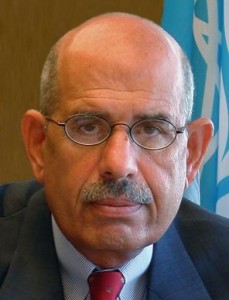Did the US Authorize Albright and Sanger to Publish the IAEA Iran Report?
Major media organizations around the world are reacting to the IAEA’s report on Iran’s nuclear technology.
Okay, anyone who reads my posts knows that the sentence above should include a link to the IAEA’s website and its posting of the original report. But I can’t include that link, because the IAEA hasn’t posted the report yet. The report is posted (pdf) at the website for David Albright’s Institute for Science and International Security, where it showed up early yesterday afternoon, and at the New York Times (pdf), in association with a story by David Sanger and William Broad. I believe that the Times copy was posted several hours after the ISIS copy.
The IAEA’s website has this information about the report, on a page with the heading “Report On Iran Nuclear Safeguards Sent to IAEA Board”:
An IAEA report on nuclear verification in Iran was circulated on 8 November 2011 to the Agency’s Board of Governors and the UN Security Council.
The Agency’s 35-member Board of Governors will consider the report at its next meeting in Vienna from 17 November 2011. The document’s circulation is currently restricted to IAEA Member States and unless the IAEA Board decides otherwise the Agency cannot authorize its release to the public.
The report, Implementation of the NPT Safeguards Agreement and Relevant Provisions of Security Council Resolutions in the Islamic Republic of Iran, was issued by the IAEA Director General. It covers developments since the last report on 2 September 2011, as well as issues of longer standing.
Note that David Albright figured prominently in many media stories leading up to the appearance of the report. He clearly had already read the report and was busy spreading his take on what the report means.
Given that Albright’s interpretation of the report fits so well with the Obama administration’s take, a question that comes to mind is whether the US authorized Albright to post the report. The IAEA information quoted above states that the IAEA is not authorized to release the report but that it was sent yesterday to the IAEA’s Board of Governors and to the UN Security Council. The information also states that current circulation is “restricted to IAEA Member States”. The US is a Member State of the IAEA.
Did the US authorize Albright’s release of the report? Read more →


